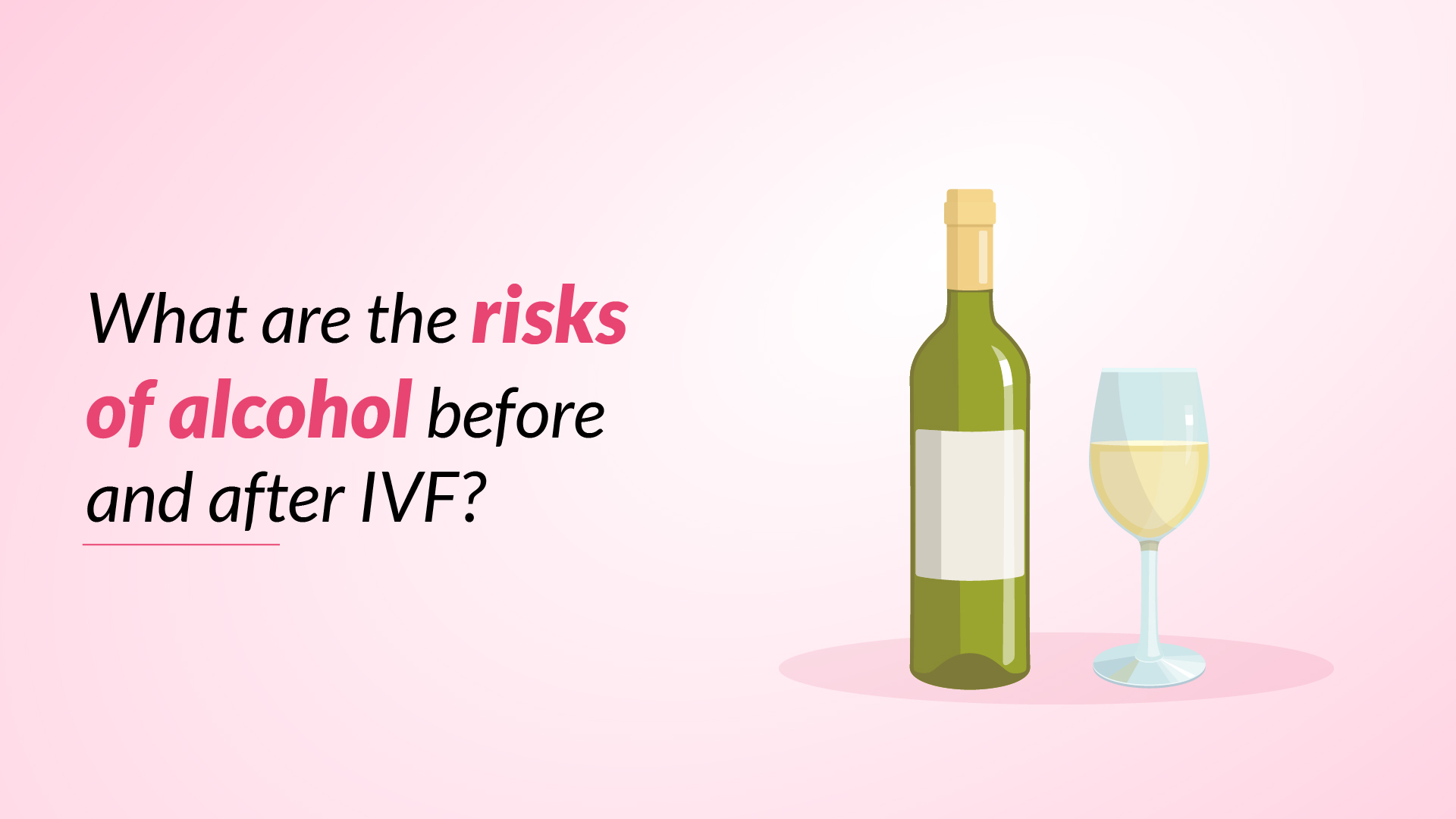Reviewed By: Dr. Jyothi C Budi – Medical Director at Ferty9 Fertility Clinic, Secunderabad, Hyderabad
In vitro fertilisation (IVF) is a complex & delicate process. It requires careful preparation and attention to various lifestyle factors. One crucial aspect that couples undergoing IVF treatment must consider is alcohol consumption. Alcohol can have significant impacts on both male and female fertility, and its effects can be particularly detrimental during the IVF journey. In this comprehensive guide, we’ll explore the risks associated with alcohol consumption before and after IVF treatment.
Also read: Ferty9’s Promise: Affordable IVF Costs with Quality Care
How Alcohol Affects Both Male and Female Fertility
Impact on Female Hormonal Balance
Alcohol drinking can disrupt the delicate hormonal balance in women, which is essential for optimal fertility. It can interfere with the generation and regulation of hormones like oestrogen, progesterone, and follicle-stimulating hormone (FSH), leading to irregular menstrual cycles, ovulation problems, and reduced chances of conception.
Reduction in Egg Quality
Excessive alcohol intake can also have a direct impact on egg quality. The ovaries are particularly vulnerable to the toxic effects of alcohol, which can damage the developing egg cells and decrease their viability. This can cause a higher risk of chromosomal abnormalities and reduced chances of successful fertilisation and implantation.
Decreased Sperm Quality and Count in Males
While the effects of alcohol on male fertility are often overlooked, it can significantly impair sperm quality and count. Alcohol consumption can decrease testosterone levels, alter sperm morphology (shape), and reduce sperm motility (movement), all of which can contribute to reduced fertility in men.
Increased Risk of Fertility-related Disorders
Chronic alcohol intake has been correlated with an increased risk of developing fertility-related disorders, such as polycystic ovary syndrome (PCOS) in women and testicular dysfunction in men. These conditions can further complicate the fertility journey and may require additional medical interventions.
Risks of Alcohol Before IVF
Impact on Egg Quality and Ovarian Reserve
Alcohol consumption before IVF treatment can have a direct impact on egg quality and ovarian reserve. The ovaries are mainly sensitive to the effects of alcohol, and even moderate drinking can result in a decrease in the number and quality of available eggs. This can lower the chances of successful fertilisation and embryo development during the IVF process.
Effects on Sperm Quality & Motility in Men
For men, alcohol consumption before IVF can negatively affect sperm quality and motility. Alcohol can decrease testosterone levels, alter sperm morphology, and reduce sperm motility, all of which can impact the success of fertilisation during the IVF process.
Increased Risk of Hormonal Imbalances
Alcohol can disrupt the delicate hormonal balance required for successful IVF treatment. It can interfere with producing and regulating hormones like oestrogen, progesterone, and follicle-stimulating hormone (FSH), which play crucial roles in the IVF process. Hormonal imbalances can lead to complications during ovarian stimulation, egg retrieval, and embryo transfer.
Potential Interference with IVF Medications
Many IVF medications, such as fertility drugs and hormonal supplements, can interact with alcohol. Alcohol consumption may alter the absorption, metabolism, and efficacy of these medications, potentially reducing their effectiveness and increasing the risk of side effects.
Reduced Chances of Embryo Development
Alcohol consumption before IVF can negatively impact embryo development. The toxic effects of alcohol can damage the developing embryo, resulting in a higher risk of chromosomal abnormalities, poor implantation, and increased chances of miscarriage.
Increased Stress and Anxiety Levels
Undergoing IVF cycles can be emotionally and physically demanding. Alcohol consumption can exacerbate stress and anxiety levels, which can further complicate the IVF process and potentially impact treatment outcomes.
Also read: Effects of Egg Abnormalities in Female Fertility
Risks of Alcohol after IVF
Impaired Embryo Implantation
Alcohol consumption after embryo transfer can impair the implantation process. The uterine lining plays an elementary role in successful implantation, and alcohol can interfere with its development and receptivity, reducing the chances of a successful pregnancy.
Increased Miscarriage Risk
If pregnancy is achieved through IVF, alcohol consumption during the early stages can significantly increase the risk of miscarriage. Alcohol can have detrimental effects on the embryo and foetus, leading to an increased risk of pregnancy loss.
Pregnancy Complications
Alcohol consumption during pregnancy, even in small amounts, can increase the risk of various complications, such as preterm labour, placental problems, and birth defects. These complications can have long-lasting effects on both the mother and the baby.
Negative Effects on Foetal Development
Alcohol is a teratogen, meaning it can cause birth defects and developmental problems in the foetus. Exposure to alcoholic content during pregnancy can result in a range of issues, including foetal alcohol spectrum disorders (FASDs), which can have lifelong impacts on the child’s physical, cognitive, and behavioural development.
Maternal Health Concerns
Alcohol consumption during pregnancy can also have detrimental effects on the mother’s health. It can increase the possibility of gestational diabetes, high blood pressure, and other pregnancy-related complications, potentially endangering the health of both the mother and the baby.
Altered Medication Efficacy
During pregnancy, women may be prescribed various medications to support a healthy pregnancy and foetal development. Alcohol consumption can interfere with the absorption and efficacy of these medications, potentially reducing their effectiveness and increasing the risk of adverse effects.
Find Hope and Solutions for Female Infertility and Male Infertility — Explore Our Comprehensive Services
IVF Treatment
IUI Treatment
ICSI Treatment
PICSI Treatment
Fertility Preservation Service
Blastocyst Culture & Transfer Treatment
Conclusion
Alcohol consumption can have notable negative impacts on fertility and the success of IVF treatment. It is essential for couples undergoing IVF treatment to abstain from alcohol consumption, both before and after the treatment process, to maximise their chances of a successful outcome. By understanding the complications associated with alcohol and making informed lifestyle choices, couples can increase their chances of achieving a healthy pregnancy through IVF.
Visit Our Clinic:
Fertility Clinic in Hyderabad
Fertility Clinic in Visakhapatnam
Fertility Clinic in Vijayawada
Fertility Clinic in Karimnagar
Fertility Clinic in Warangal
Fertility Clinic in Rajahmundry
Fertility Clinic in Tirupati
Fertility Clinic in Kurnool




